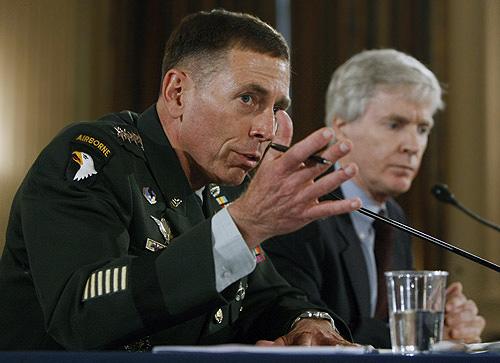U.S. general outlines plan to withdraw troops

Gen. David Petraeus, left, and Ambassador Ryan Crocker testify on the future of the war in Iraq before a joint hearing of the House Armed Services Committee and House Foreign Relations Committee on Monday in Washington. THE ASSOCIATED PRESS, GERALD HERBERT
Sep 11, 2007
Last updated on May 12, 2016 at 03:33 p.m.
WASHINGTON – The top U.S. general in Iraq outlined plans Monday for the withdrawal of 30,000 troops by next summer, drawing praise from the White House but a chilly reception from anti-war Democrats.
Gen. David Petraeus said a 2,000-member Marine unit would return home this month without replacement in the first sizable cut since a 2003 U.S-led invasion toppled Saddam Hussein and unleashed sectarian violence.
Further “force reductions will continue,” he told a nationally televised congressional hearing that was frequently interrupted by anti-war protesters.
Petraeus said it would be “premature to make recommendations on the pace,” and he recommended that President Bush wait until March 2008 to make any decisions.
Get The Daily Illini in your inbox!
The cuts he outlined would return the U.S. force to levels in place when Bush ordered a buildup last winter to allow the Iraqi government time to forge a reconciliation among feuding factions.
Petraeus slid into the witness chair at a politically pivotal moment in a war that has claimed the lives of more than 3,700 U.S. troops in more than four years. The Pentagon reported nine deaths on Monday.
The president invited congressional leaders to a meeting Tuesday at the White House, and is expected to make a nationwide speech on the war in the next few days. White House press secretary Tony Snow said Bush will place a lot of weight on his general’s recommendations.
Snow said Bush “liked what he heard last week” when he was briefed on Petraeus’ plans. “But he is commander in chief and it will be up to him to make final determinations about what he will recommend,” the spokesman noted.
Inside the crowded congressional hearing room, Rep. Tom Lantos, the chairman of the House Foreign Affairs Committee, told Petraeus that his proposal amounted to only a “token withdrawal” after years of war.
“What I recommended was a very substantial withdrawal,” the general replied evenly from the witness chair, his uniform adorned by four gleaming general’s stars and nine rows filled with medals. “Five Army brigade combat teams, a Marine Expeditionary Unit and two Marine battalions represent a very significant force.”
Petraeus referred only obliquely to the considerable political difficulties in Iraq, saying, “Lack of adequate governmental capacity, lingering sectarian mistrust and various forms of corruption add to Iraq’s challenges.”





